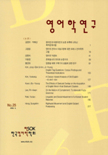On the Notion of Complement - To Advocate Fuzzy Grammar
On the Notion of Complement
- 한국영어학학회
- 영어학연구
- 영어학연구 제25호
-
2008.06171 - 193 (23 pages)
- 53

This article deals with the notion of complement and, concomitantly, with that of adjunct (or modifier). The main argument of this article is that the notion of complement, and at the same time the notion of adjunct, should be understood in terms of degreehood or gradience. Then we will have a (more) prototypical complement or a (more) peripheral (i.e. a less prototypical) complement. To judge the prototypicality or the peripherality of a possible complement, we should have several distinguishing criteria (or tests or characteristics) for complements. The more criteria are met, the higher the prototypicality of the element will be. Thus the notion of complement shows the so-called Subsective Gradience (gradience within a particular class of linguistic elements), ? la Aarts (2004, 2007). Despite the gradience observed within the notion of complement, however, the lessening of the prototypicality of the element to become a complement does not mean the increasing of the possibility for the element to become an adjunct, since there is assumed to be a clear boundary between the two notions. Ultimately, there is no Intersective Gradience, ? la Aarts (2004, 2007), in the distinction between complement and adjunct. It will be concluded that there is no element which is both a complement and an adjunct in a specific construction.
1. Introduction<BR>2. The Notions of Complement and Adjunct<BR>3. The Distinguishing Criteria for Complements and Adjuncts<BR>4. Fuzziness and Linguistic Gradience<BR>5. Closing Remarks<BR>References<BR>
(0)
(0)